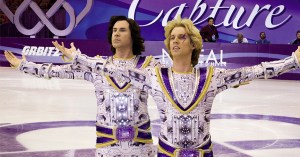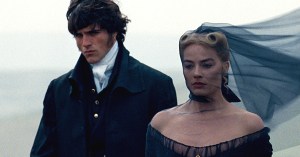Vanessa Estelle Williams’ Twist Return to the Candyman Franchise Brings The Urban Legend Full Circle
The star of the original slasher and its spiritual sequel on each film's unique point of view, her character's rise from the ashes, and becoming a finger-wagging meme.

(Photo by © Universal / courtesy Everett Collection)
The following interview contains minor spoilers for 2021’s Candyman.
It’s been almost 30 years since the 1992 hit Candyman was released, marking the arrival of the first Black “boogeyman” to appear on the big screen. It became an instant classic and the urban legend at its center has frightened both children and adults for generations. You didn’t even have to see the movie to be terrorized at the thought of summoning the Candyman by daring – and failing in my case! – to say his name out loud five times in the mirror. Today, we can thank the likes of powerhouse filmmakers Jordan Peele (Get Out, Us) and Nia DaCosta (Little Woods) for bringing us a new chapter in the franchise in 2021.
The 2021 Candyman isn’t a remake, though. In the words of Peele, it’s a “spiritual sequel.” And the only actors to work on both projects are Tony Todd, playing the titular character in a brief appearance, and Vanessa Estelle Williams, who plays Anne-Marie McCoy. In the original, McCoy was a single mother living in the housing projects of Cabrini-Green whose infant son Anthony was kidnapped by the Candyman himself; fast-forward to present-day Chicago, and we get to see what happened to this family whose worlds were rocked by the infamous ghoul with a hook for a hand.
We see a very different Anne-Marie McCoy and a very different Cabrini-Green in 2021. While the original Candyman acknowledged the racial violence America was built upon, this installment takes things to a new level. There’s a shift in narrative that examines that brutal history in far greater depth and names the many ways it continues to exist and impact the Black community to this day.
Kristian Fanene Schmidt for Rotten Tomatoes: I know I can’t possibly be the first person to say this, but it’s been about 30 years since the original came out and you haven’t aged a day! You look amazing.
Vanessa Estelle Williams: Tell me more. I never get tired of hearing that!
Rotten Tomatoes: What do you see as the legacy of the original?
Williams: The legacy of the original was just an opportunity to go into the mind, into the space, into the neighborhood and really delve into the story. And so, it’s haunting, because there’s this tension between victim and monster in all the horror genres. And I love to quote what Jordan Peele says about the real center of the spiritual sequel that Candyman 2021 is, that it’s the central dance between the monster and the victim and the racial history of this country.

(Photo by © TriStar/courtesy Everett Collection)
And I think that’s part of the appeal of both of the films, that it lives so centrally in the ethos and the sort of the fabric of the tension of Black people in America, the history. And what’s so poignant and key for me is that this reincarnation of it is from a Black point of view, unapologetically, authentically, and centered in the voice and from the lens of the people that it’s happening to. And it also breaks down Candyman’s [motive], the why, so you understand the history and what he’s trying to avenge.
Rotten Tomatoes: The original was written and directed by Bernard Rose, a white man…
Williams: Bernard Rose, a wonderful filmmaker, and with his own aesthetic and point of view.
Rotten Tomatoes: And now you have this film that was written and directed by Nia DaCosta, a Black woman. And you and Tony Todd, who plays Candyman, are the only people to reprise your roles! So only you can compare the experiences of filming them.
Williams: Well, both films were wonderful experiences. Working with Bernard, he’s a wonderful storyteller. I liked his sort of psychological thriller, all of his films. It was a wonderful set to walk onto. It was only my second feature film. I got into Hollywood. I was like, “Okay.” There certainly was a sort of openness and a wonderful welcoming in the process of working with him. But it’s about the difference between what two different kinds of artists and directors bring to a film, what they bring from having lived the lives that they’ve lived.
And so, the way that the newer one speaks to the times, speaks to the violence of, let’s say, gentrification, coming into a community, it’s like a re-colonization of a space, right? Where we come into a community, and they remove the indigenous people there, they deconstruct and destroy all the remnants of them and then rebuild and rename, so that the people are completely obliterated and their livelihoods, and the ability to live in that neighborhood. is no longer sustainable.

(Photo by Universal Pictures)
So that’s the serious history of our country, redlining, and all of the things that are part of the history of the country that could only be potently told from the point of view of Black people. To tell the story authentically, in the way that Black Wall Street and all these new implications of stories, little-known history, that is the fabric of American history, so that we get to sneak that education into the entertainment genre of horror, is just slick and hip and happening, and would get to an audience that may not just sit down and watch “1619,” for instance.
I also want to be sure to recommend that people utilize the website www.candymanmovie.com/impact, because there was a 20-minute panel discussion at our screening about the deeper meaning of Black horror and the impact of it. And so, it really opens up the discussion. It really delves into the imagery and what the story is saying and is a great companion to watching the movie. People make these kinds of reviews about all of Jordan Peele’s films, and Monkey Paw’s films, like the deeper meaning and stuff like that. But this is something also ready-made. So people have a very full experience of it.
Rotten Tomatoes: Nice! You play Anthony’s mother, and you yourself are a mother of two sons, right?
Williams: Two sons who are artists, visual artists. So it was so wonderful to realize that, oh, Anthony’s a visual artist, wait a minute, wait a minute, wait a minute. Art reflecting life. And so much to pull from, as I got into the character. There’s a certain kind of parenting that gets out of the way of your child to let them be what they come here to be. And so, it speaks to what Anne-Marie was able to do, from the ashes, literally of the traumatic experience from living in Cabrini, from having her child stolen, from having her child returned, to forgiving the woman who came in busy-bodying around and conjuring up this story we told her to be quiet about, and getting my baby all involved and my dog killed and all of the trauma of that. Anne-Marie been through some s–t.
And so, then she was able to level up. Now she works as a nurse assistant and has been able to create a life, to educate her child and give him the option, the freedom, to make his life as an artist. That’s bold. That’s not something you think of when you think of some typical idea of what happens to children who grew up in Cabrini-Green.

(Photo by © Universal / courtesy Everett Collection)
Rotten Tomatoes: When Anthony says the word “Candyman,” your reaction to it is already iconic. It’s become a meme now. How does it feel to be a meme?
Williams: It blew me away. I thought initially that because the fans are so smart and they put things together and they were really trying, the film company and the marketing was really trying to keep Anthony as a secret. So I didn’t even initially think I was going to be in the trailer at all, because I knew that they wanted to hold that in.
So then to see that trailer come out and then to become a meme, and then to get turned into so many memes, it just was so much fun. It was particularly fun because we were in lockdown. And so, it was amazing, amazing, amazing, and big fun, and just another thing to be proud of and just enjoy as a part of people’s response to the work. I really felt very gratified in that.
Candyman is in theaters now.






